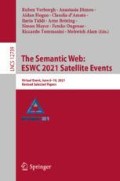Abstract
Knowledge graphs represent an unparalleled opportunity for machine learning, given their ability to provide meaningful context to the data through semantic representations. However, general-purpose knowledge graphs may describe entities from multiple perspectives, with some being irrelevant to the learning task. Despite the recent advances in semantic representations such as knowledge graph embeddings, existing methods are unsuited to tailoring semantic representations to a specific learning target that is not encoded in the knowledge graph.
We present evoKGsim+, a framework that can evolve similarity-based semantic representations for learning relations between knowledge graph entity pairs, which are not encoded in the graph. It employs genetic programming, where the evolutionary process is guided by a fitness function that measures the quality of relation prediction. The framework combines several taxonomic and embedding similarity measures and provides several baseline evaluation approaches that emulate domain expert feature selection and optimal parameter setting.
Access this chapter
Tax calculation will be finalised at checkout
Purchases are for personal use only
References
Asif, M., Martiniano, H.F., Vicente, A.M., Couto, F.M.: Identifying disease genes using machine learning and gene functional similarities, assessed through gene ontology. PLoS ONE 13(12), e0208626 (2018)
Bordes, A., Usunier, N., Garcia-Duran, A., Weston, J., Yakhnenko, O.: Translating embeddings for modeling multi-relational data. In: Advances in Neural Information Processing Systems, pp. 2787–2795 (2013)
Cardoso, C., Sousa, R.T., Köhler, S., Pesquita, C.: A collection of benchmark data sets for knowledge graph-based similarity in the biomedical domain. Database 2020 (2020)
Harispe, S., Ranwez, S., Janaqi, S., Montmain, J.: Semantic Similarity from Natural Language and Ontology Analysis. Morgan & Claypool Publishers (2015)
Holter, O.M., Myklebust, E.B., Chen, J., Jimenez-Ruiz, E.: Embedding OWL ontologies with OWL2vec. In: CEUR Workshop Proceedings, vol. 2456, pp. 33–36. Technical University of Aachen (2019)
Pesquita, C., Faria, D., Bastos, H., Ferreira, A.E., Falcão, A.O., Couto, F.M.: Metrics for GO based protein semantic similarity: a systematic evaluation. BMC Bioinform. 9, 1–16 (2008). https://doi.org/10.1186/1471-2105-9-S5-S4
Ristoski, P., Paulheim, H.: RDF2Vec: RDF graph embeddings for data mining. In: Groth, P., et al. (eds.) ISWC 2016. LNCS, vol. 9981, pp. 498–514. Springer, Cham (2016). https://doi.org/10.1007/978-3-319-46523-4_30
Ristoski, P., Paulheim, H.: Semantic Web in data mining and knowledge discovery: a comprehensive survey. J. Web Semant. 36, 1–22 (2016)
Sousa, R.T., Silva, S., Pesquita, C.: Evolving knowledge graph similarity for supervised learning in complex biomedical domains. BMC Bioinform. 21, 1–19 (2019)
Wang, Q., Mao, Z., Wang, B., Guo, L.: Knowledge graph embedding: a survey of approaches and applications. IEEE TKDE 29(12), 2724–2743 (2017)
Yang, B., Yih, S.W., He, X., Gao, J., Deng, L.: Embedding entities and relations for learning and inference in knowledge bases. In: Proceedings of the ICLR (2015)
Zhong, X., Kaalia, R., Rajapakse, J.C.: GO2Vec: transforming GO terms and proteins to vector representations via graph embeddings. BMC Genomics 20(9), 1–10 (2019)
Acknowledgements
CP, SS, RTS are funded by the FCT through LASIGE Research Unit, ref. UIDB/00408/2020 and ref. UIDP/00408/2020. CP and RTS are funded by project SMILAX (ref. PTDC/EEI-ESS/4633/2014), SS by projects BINDER (ref. PTDC/CCI-INF/29168/2017) and PREDICT (ref. PTDC/CCI-CIF/29877/2017), and RTS by FCT PhD grant (ref. SFRH/BD/145377/2019). It was also partially supported by the KATY project which has received funding from the European Union’s Horizon 2020 research and innovation programme under grant agreement No 101017453.
Author information
Authors and Affiliations
Corresponding author
Editor information
Editors and Affiliations
Rights and permissions
Copyright information
© 2021 Springer Nature Switzerland AG
About this paper
Cite this paper
Sousa, R.T., Silva, S., Pesquita, C. (2021). evoKGsim+: A Framework for Tailoring Knowledge Graph-Based Similarity for Supervised Learning. In: Verborgh, R., et al. The Semantic Web: ESWC 2021 Satellite Events. ESWC 2021. Lecture Notes in Computer Science(), vol 12739. Springer, Cham. https://doi.org/10.1007/978-3-030-80418-3_26
Download citation
DOI: https://doi.org/10.1007/978-3-030-80418-3_26
Published:
Publisher Name: Springer, Cham
Print ISBN: 978-3-030-80417-6
Online ISBN: 978-3-030-80418-3
eBook Packages: Computer ScienceComputer Science (R0)

